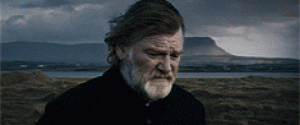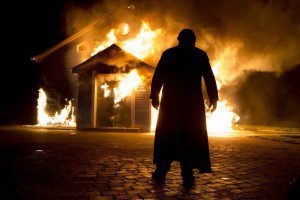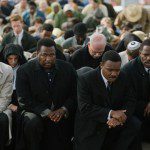 Nominations for the Academy Awards came out yesterday morning. Among the eight Best Picture nominees, the Academy lauded the creative triumph Boyhood, the artistic weirdness of Birdman, the inspirational story of Selma and even the very Anderson-esque Wes Anderson movie The Grand Budapest Hotel. All the nominees make sense, I suppose, even as pundits from across the Interweb lament some obvious snubs.
Nominations for the Academy Awards came out yesterday morning. Among the eight Best Picture nominees, the Academy lauded the creative triumph Boyhood, the artistic weirdness of Birdman, the inspirational story of Selma and even the very Anderson-esque Wes Anderson movie The Grand Budapest Hotel. All the nominees make sense, I suppose, even as pundits from across the Interweb lament some obvious snubs.
But the worst snub, in my opinion, was one that not many are discussing: The complete shutout of one of the best movies of the year, Calvary.
I think many folks simply forgot about the pic. After all, it was released in August—not exactly a hot release month for Oscarbait—and made just $3.6 million this year (unlike early releases like Boyhood and Grand Budapest). And perhaps the subject matter was discomforting. Religion is often ignored in prestige movies. And when it is showcased, it’s often shown in a positive but somewhat untouchable light (see Selma, for instance). Not many films dare ask the unanswerable question: What is religion, really? What is it good for? Calvary dares ask, and that can make it uncomfortable viewing. Set in Ireland, Calvary is the story of a good priest dealing with a disinterested, increasingly hostile parish; a holy man walking through the land of Ninevah.
The movie opens in a confession booth, where an unknown parishioner details the abuse he suffered as a child at the hands of a priest. He confesses this deep, lingering hurt to the righteous, well-meaning Father James (Brendan Gleeson) … and in recompense for his suffering, threatens to kill the priest in seven days.
“There’s no point in killing a bad priest,” the parishioner tells him. “But killing a good one? That would be a shocker.”
And so begins the worst week of Father James’ life—even though that life doesn’t look that much different at first. The priest goes about doing his work, trying to encourage his parishioners in times of trouble, exhorting them in his own understated way to be better people.
But it’s clear, to both him and us, that he’s doing precious little for these people. They disregard his advice and openly mock he and his faith. “Run along now, father,” an abusive adulterer tells him. “Your sermon is finished.”
 Many of his flock are openly disgusted by the Catholic Church. They talk about its perceived wealth as they themselves lose their businesses. They dwell on the pedophile priest scandal. They drag up some of the most shameful events of the Church’s long, checkered history. “When you have a history of screwing the Jews out of their money and collaborating with Nazis, it’s like the pot calling the kettle black, isn’t it?” one says, shrugging off James’ advice. They poke Father James with terrible anecdotes that suggest God is either callous to human suffering or not around at all. And when Father James’ sanctuary burns to the ground, people stand about the sacred bonfire, staring at the spectacle. Some laugh. No one, except, Father James himself, seems to see it as much of a loss.
Many of his flock are openly disgusted by the Catholic Church. They talk about its perceived wealth as they themselves lose their businesses. They dwell on the pedophile priest scandal. They drag up some of the most shameful events of the Church’s long, checkered history. “When you have a history of screwing the Jews out of their money and collaborating with Nazis, it’s like the pot calling the kettle black, isn’t it?” one says, shrugging off James’ advice. They poke Father James with terrible anecdotes that suggest God is either callous to human suffering or not around at all. And when Father James’ sanctuary burns to the ground, people stand about the sacred bonfire, staring at the spectacle. Some laugh. No one, except, Father James himself, seems to see it as much of a loss.
“Your time is gone, and you don’t even f—ing realize it,” a barkeeper tells James. It’s a dark thought that becomes even darker because James suspects the barkeep might be right. The priest feels it. And he begins to wonder whether he’s doing any good at all. And he wonders whether it’d be better if he just left. Left the parish. Left the faith. Run away from it all.
But then, in strange, dark moments, the beauty of faith sneaks beside him and grasps his hand.
One black night, Father James settles beside a new widow in a hospital, grieving over the unexpected loss of her husband.
“He was a good man, your husband?” he asks.
“Yes,” the woman says. “He was a good man. We had a very good life together. We loved each other very much. And now, he has gone. And that is not unfair. That is just what happened. But many people don’t live good lives. They don’t feel love. That is why it’s unfair. I feel sorry for them.”
The two talk for a bit. James admits that some people’s faith can be shaken in moments like these. Some turn to religion because they fear death. They long to find some solace for that mysterious hereafter. But when that fearful moment comes too close, they find their faith vanishes like a wraith.
“It must not have been much of a faith to begin with, if it is so easy to lose it,” the woman says.
She is a woman of strong faith, this widow. Her husband is dead, yes. But it does not invalidate her belief in a good, loving God. James came to offer comfort. Instead, he walks away comforted.
Father James does not run away from his faith or fate. He stays true to his people, even as they leave him. Even on what may be his last day, James visits his flock and spreads what advice and comfort and even joy that he can. He faces his apparent killer with peace and love.
 “I think there’s too much talk about sins, to be honest,” he tells someone earlier. “And not enough talk about virtues.” And when he’s asked what the greatest virtue is, he answers forgiveness. “I think forgiveness has been highly underrated.”
“I think there’s too much talk about sins, to be honest,” he tells someone earlier. “And not enough talk about virtues.” And when he’s asked what the greatest virtue is, he answers forgiveness. “I think forgiveness has been highly underrated.”
In that moment, standing before a man with a gun, Father James forgives his would-be killer—whether he pulls the trigger or not. In the face of death, James offers life. In the midst of sin, he models virtue—perhaps the greatest virtue of them all. He is a good man to be apparently killed for the sins of others, perhaps for his whole Church. He doesn’t know what he’s doing, perhaps James thinks. Father, forgive him.
James admits that he regrets never having finished Moby Dick. The killer recaps it quickly: Captain Ahab eventually grapples with the massive white beast, and the two plunge to the ocean’s bottom, taking the ship with him.
Director John Michael McDonagh is suggesting, I think, that the church is society’s great white whale, harpooned by the Ahabs of our culture. He does not suggest that the beast of religion is without its problems. But in killing it, McDonagh wonders we might also be destroying ourselves.













